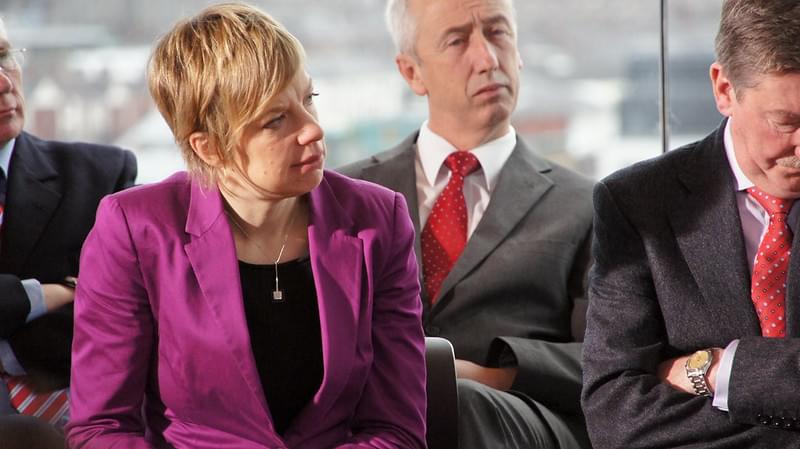The recent ascent of Ivana Bacik to the top of the political pops should come as no surprise. The Dublin Bay South TD encapsulates all that the Labour party has come to stand for today, which is actually very little. Taking the reins from Tipperary TD Alan Kelly, Bacik faces a serious identity crisis for Labour, which isn’t helped by her own political history and the manner in which she has been elevated to this commanding position.
The newly appointed leader has spent a considerable amount of time trying to get to where she is now. Bacik has an extensive history of rejection by both the electorate and her current party, failing in the 2004 European Parliament elections, and only being elected to the Seanad and the Dail on her third attempt. On one such attempt to become a TD was in 2011. Bacik found herself unselected by Labour members to run in Dublin South East, instead being lumped in as Eamon Gilmore’s running mate in Dún Laoghaire.
“Bacik has done little if anything to shake off these ragged values or atone for her connection to the implementation of austerity.”
Bacik comes from a background of considerable generational wealth, with herself a millionaire (alongside party colleague Aodhán Ó Ríordáin). As such, it is difficult to see her as understanding of pressing issues such as the housing crisis and health costs, which were exacerbated by her party while in government with Fine Gael. Some may point towards her activism on abortion rights as noteworthy and positive, which although commendable and important, doesn’t exactly gel well with a dubious track record on the issue of sex work. For example, Bacik has openly supported the Nordic Model, and has gone as far to say that sex work should not be considered work. Bacik has done little if anything to shake off these ragged values or atone for her connection to the implementation of austerity. It remains to be seen if any of this will change with her new, more prominent role.
Since assuming the office of leader of the Labour Party in the late Spring of 2020, Bacik’s predecessor Alan Kelly has done little to sway the voting intentions of people in this country towards his party. Taking over from Brendan Howlin after a disastrous general election, he inherited a big challenge, with Labour at its lowest ever number of seats in Dáil Éireann (six). Polling at most at 5% (Red C) back then, and continuously polling now as low as 3%, Labour have stagnated over the course of the pandemic under Kelly’s leadership. This puts them firmly within electoral reach of rivals like the Social Democrats and perhaps even People Before Profit. Beyond the numbers, Kelly’s stint at the helm shows he has produced little of note politically. His inaction and general lack of ambition has carved open a gap for others to fill in terms of policy to target a wider voter base. There has been minimal overhaul or revitalisation of values, with an air of staleness still clinging to Labour since their malignant time propping up Fine Gael.
“It’s a little hard to believe that she is in some way a clean break from that grim period given her role as leader of the party in the Seanad during those years.”
With a noted lack of confidence in his leadership position from fellow members, Kelly stood down with belief from others that his heavy association with the 2011-16 government was a key reason too. This is fine, although logically inconsistent given Bacik’s own involvement with the same government. It’s a little hard to believe that she is in some way a clean break from that grim period given her role as leader of the party in the Seanad during those years. It is difficult to understand how she is not as complicit in the class warfare and austerity Labour knowingly enacted with Fine Gael. As a slight aside, it would be wrong to accuse Labour of betraying the working class (as many believe they did), because this implies they ever had an actual connection to the working class in the first place. Instead they have scrounged and survived on a superficial liberal image which has been polished up for middle-class people to feel try and good about themselves politically. Forget about that horrific few years in government; everything is fixed now because one man involved then is no longer in charge. Here’s a millionaire with a chunk of generational wealth who is going to make things better, and definitely has no link to those terrible things we allowed to happen. Let’s be real, both individuals have responsibility, yet seemingly not in the eyes of those who have the power to choose who leads.
With Fine Gael and Fianna Fáil winning middle class echelons of the voter base, Sinn Féin surging in support from the middle classes while holding ground in working class areas, and gaps being plugged up by other small parties, Labour face a few questions: who are they, and who are they for? By allowing Bacik, who has deep associations with a government of austerity, to assume control uncontested, Labour are doubling down on the current perception that they are not for the working class of this country and never will be. I will say though, to throw them a bone, it’s hard to see what alternatives would have been viable given the only other major name touted to contest the issue of leadership was Aodhán Ó Ríordáin, who was already rejected previously in favour of Alan Kelly. With all other Labour TDs standing aside, the result has been more of a coronation than democratic election, which only serves to perpetuate the party’s terminally middle-class reputation.






